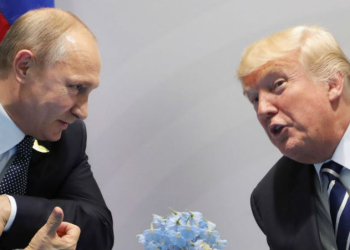The FINANCIAL — On September 3, 2020, the meetings of the OSCE Permanent Council were resumed, where, at the initiative of the Georgian side, the launch of a large-scale military aggression by Russia against Georgia in 2008 and the occupation of the Abkhazia and Tskhinvali regions of Georgia were discussed. At the OSCE Permanent Council, a group of friends of Georgia made a joint statement. The group of friends condemned the killings of Georgian citizens Archil Tatunashvili, Giga Otkhozoria and Davit Basharuli and called on the Russian Federation, not to prevent the perpetrators from being brought to justice.
Ketevan Tsikhelashvili, Georgia’s Permanent Representative to the OSCE, told the delegations that 12 years after the August war, the Russian Federation was still not fulfilling the EU-brokered ceasefire agreement of 12 August 2008; Moreover, Russia is further intensifying the militarization of the occupied regions and taking steps towards their de facto annexation. It was said that against the background of the COVID-19 pandemic, Russia does not stop provocative actions and actively uses the tools of hybrid war against Georgia. In this regard, the baseless allegations made by high-ranking Russian officials against Richard Lugar’s laboratory were noted
. The Georgian side stressed that the occupation line is being reinforced with barbed wire and other artificial barriers, accompanied by illegal detentions of local residents. In this context, the Ambassador of Georgia focused on the fact that a Georgian citizen, Zaza Gakheladze, was wounded and illegally detained by the occupation forces. He noted the need for the immediate release of Zaza Gakheladze and two other people currently being held captive by the occupation regime – Gennady Bestaev and Khvicha Mghebrishvili.
The Georgian delegation also spoke about the importance of the Geneva International Talks and key issues. It should be noted that on the anniversary of the 2008 war, a special statement was made by a group of Georgian friends in the OSCE, whose members are: Bulgaria, Canada, Czech Republic, Estonia, Finland, Ireland, Latvia, Lithuania, Norway, Poland, Romania, Sweden, Ukraine, United Royal and US.
The statement stressed the unacceptability of so-called “borderization” activities across the dividing line between the Tbilisi-controlled territory and the occupied regions, noting that it violates the human rights of local residents and restricts their freedom of movement. The Group of Friends called on Russia to fulfill its obligations under the EU-brokered ceasefire agreement from August 12, 2008 and joined Georgian demands to allow access for international missions, in particular the EUMM, to the regions of Abkhazia and Tskhinvali/South Ossetia. The Group of Friends also expressed their support for Georgian peace initiatives aimed at confidence-building and reconciliation among people residing on both sides of the dividing line. In his address during the meeting of the OSCE Permanent Council on September 3, U.S. Ambassador James S. Gilmore III expressed support for the joint statement by the Group of Friends of Georgia, condemning once again Russian activities in the occupied regions of Georgia and along the Administrative Boundary Lines, according to civil.ge.
“Russia-led security forces continue to encroach deeper into Georgia, trying to expand the occupied territories meter by meter. In the past year, we also witnessed a Russian-led attempt to control hundreds of meters of additional Georgian territory at Chorchana-Tsnelisi.” Ambassador Gilmore added.
The group is closely following the case of the death of Irakli Kvaratskhelia, a Georgian citizen detained at a Russian military base. The group of friends also condemned the killings of Georgian citizens Archil Tatunashvili, Giga Otkhozoria and Davit Basharuli and called on the Russian Federation, as an effective controller in the regions of Abkhazia and South Ossetia, not to prevent the perpetrators from being brought to justice. The members of the group support the implementation of preventive measures by Georgia, which aim to eliminate the feeling of impunity in the occupied regions of Georgia and the need to improve the human rights situation. In this context, they note the adoption of the Otkhozoria-Tatunashvili list by the Georgian government. The Group supports the Geneva International Talks and the Incident Prevention and Response Mechanisms and emphasizes the need to make progress in these formats.
The Co-Chairs of the Geneva International Discussions has also issued a statement. They stated that they reiterate their call for co-operation and dialogue, especially across conflict lines, during this global pandemic. As they said, the GID format remains a crucial venue to address both security and humanitarian concerns, particularly for conflict-affected populations. They welcomed the participants’ regular consultations with them during the pandemic, as well as the resumption of the regular meetings of the Incident Prevention and Response Mechanism in Ergneti. They encouraged the resumption of the Gali IPRM, however at the same time, they said that they are concerned that crossing points remained closed as reported by Georgian Public Broadcasting.
On 30 July 2020, the 96th Incident Prevention and Response Mechanism (IPRM) took place in Ergneti, co-facilitated by Ambassador Marek Szczygieł, Head of the EU Monitoring Mission in Georgia (EUMM) and Ambassador Rudolf Michalka, Special Representative of the OSCE Chairperson-in-Office for the South Caucasus. As the Head of the EU Monitoring Mission noted the meeting was held in a positive and constructive atmosphere. The participants discussed several issues pertaining to stabilisation and normalisation on the ground. Read more.
The EU delegation speaks out about the Georgian-Russian war’s 12th anniversary





























Discussion about this post